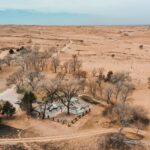Hurricane Igor battered Bermuda with ferocious winds, waves and rain Sunday, felling trees and power lines in the Atlantic island chain in one of the worst storms to hit the British overseas territory.
The U.S. National Hurricane Center said the core of the “very large” hurricane, packing maximum sustained winds near 75 miles per hour, was passing just west of Bermuda, a popular tourist destination and wealthy global insurance center more than 600 miles east of the U.S. East Coast.
Residents reported uprooted trees, flying debris, widespread power outages, some flooding of streets and homes and boats torn free from moorings by pounding waves battering the coast. But there were no immediate reports of casualties.
At 11 p.m. EDT/0300 GMT, Igor’s center was about 40 miles west of Bermuda, moving north northeast at 14 miles per hour.
Hurricane force winds extended out about 90 miles from Igor’s center, and radar images showed its swirling shape dwarfing the 21 square-mile island group.
Power lines were knocked out, interrupting service to customers — well over half of the territory’s electricity users — according to the local power utility Belco. Bermuda has a population of more than 67,000.
Police spokesman Dwayne Caines reported “high winds, very intense” and said closed circuit TV cameras were showing waves 10-12 feet high “almost coming to the buildings in front of the ferry terminal” in the capital Hamilton.
A weather observation station in Bermuda said one wind gust reached 93 miles per hour .
Hurricane conditions were expected to continue overnight into early Monday.
“The rain is coming in sideways, basically it is very rough. Trees are down and there are branches blowing all over the place and there is lots of debris flying,” Mark Tatem, a photographer for The Royal Gazette newspaper, wrote in a live hurricane chatroom set up by the paper.
Several roads in the capital were flooded.
BRITISH NAVY DESTROYER STANDS BY
Bermuda Premier Ewart Brown had warned residents to brace for “one of the worst hurricanes to ever threaten our shores”.
David Saul, a 70-year-old businessman whose home overlooks Devonshire Bay in the center of the island chain, earlier reported seeing “stupendous” waves.
“The waves are thrashing on the road,” he said.
Bermuda’s roads were deserted and churches had canceled services. Most shops and restaurants in the capital were boarded up and residents had bought up emergency supplies like fuel, batteries, food and candles.
Local authorities Sunday closed the causeway that links L.F. Wade International Airport and the eastern parish of St. George’s to the rest of Bermuda. The airport was also closed.
The British Royal Navy’s destroyer HMS Manchester was on standby with a helicopter.
“It’s a ghost town out there,” said vacationer Tipper Raven of London, referring to the capital Hamilton.
The Bermuda government has warned residents to prepare for an impact similar to that of Hurricane Fabian in 2003, which killed four people and caused millions of dollars of damage.
Hurricane expert Jeff Masters of private U.S. forecaster Weather Underground said Igor lost some of its original power due to the collapse of its eyewall — a hurricane’s most damaging inner zone — earlier Sunday.
He wrote in a blog that buildings in Bermuda, which has a rigorous building code, were some of the best-constructed in the world, and were generally located at higher elevations out of storm surge zones, which would help limit damage from Igor.
The hurricane center predicted total rainfall of 6 to 9 inches over the Atlantic territory and said Igor’s storm surge could produce significant coastal flooding and destructive waves, particularly along the south coast.
Large sea swells would also affect the U.S. East Coast through Monday, it added.
East of Igor, weakening Tropical Storm Julia posed no threat to land, and it was expected to dissipate Tuesday, the hurricane center said.
In Mexico over the weekend, the remnants of Hurricane Karl dissipated over the mountains of south central Mexico, after killing at least eight people, emergency workers said.
Karl appeared to have spared Mexican oil operations from major damage after sweeping through the Bay of Campeche, where Mexico produces more than two-thirds of its 2.55 million barrels per day of crude output.
(Additional reporting by Katharine Jackson in Hamilton, Bermuda, and Luis Manuel Lopez in Villahermosa, Mexico; Writing by Pascal Fletcher; Editing by Todd Eastham)
Was this article valuable?
Here are more articles you may enjoy.

 Oregon Schools Sued for $9M After Young Girl Allegedly Raped
Oregon Schools Sued for $9M After Young Girl Allegedly Raped  Report: Vehicle Complexity, Labor ‘Reshaping’ Auto Insurance and Collision Repair
Report: Vehicle Complexity, Labor ‘Reshaping’ Auto Insurance and Collision Repair  Viewpoint: How Generative AI Enables a Brighter Claims Future in 2024 and Beyond
Viewpoint: How Generative AI Enables a Brighter Claims Future in 2024 and Beyond  Texas Among Several States Facing New Fire Risks: Weather Watch
Texas Among Several States Facing New Fire Risks: Weather Watch 